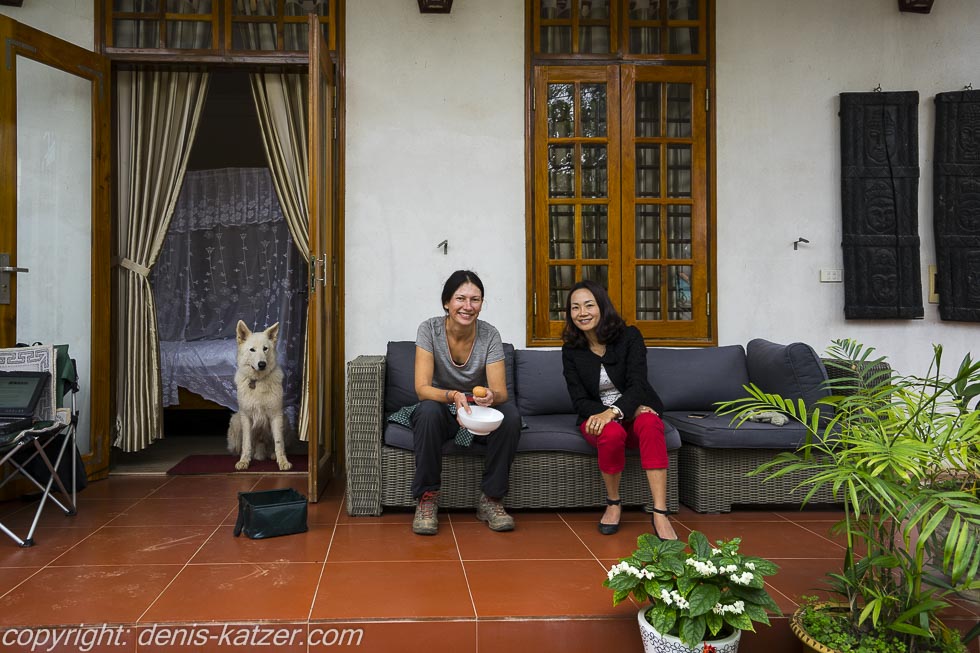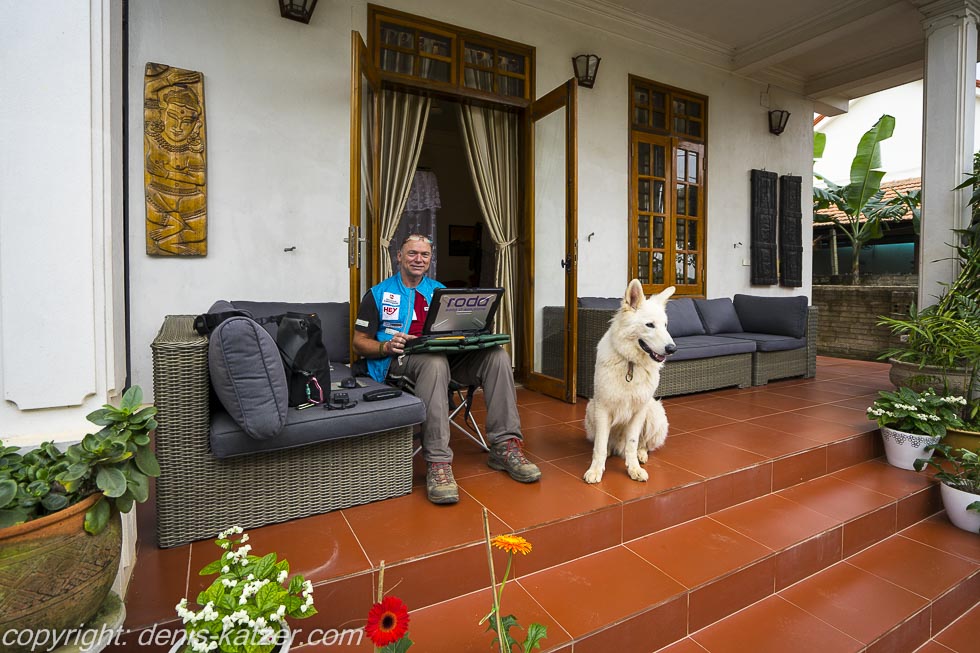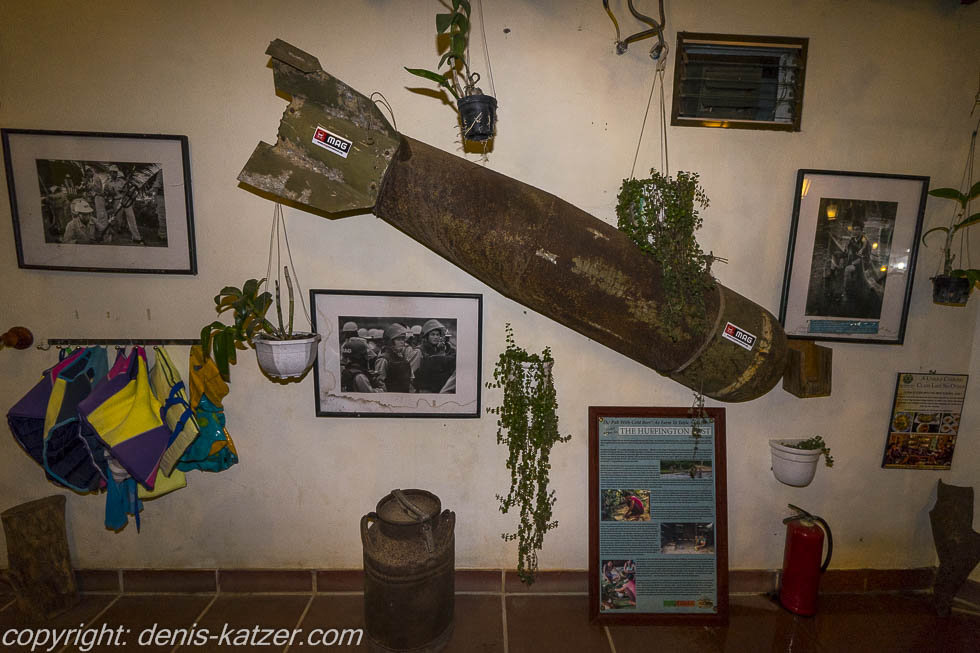
Bomb in the garden and contaminated for the next 300 years
N 17°37'28.6'' E 106°23'07.4''
Date:
28.11.2016 until 29.11.2016
Day: 521 – 522
Country:
Vietnam
Province:
Quảng Bình
Location:
Phong Nha Farm Stay
Latitude N:
17°37’28.6”
Longitude E:
106°23’07.4”
Total kilometers:
20,992 km
Total altitude meters:
58.432 m
Sunrise:
06:06 a.m. – 06:07 a.m.
Sunset:
5:17 pm
Temperature day max:
18°C
(Photos of the diary entry can be found at the end of the text).
“My mother helped fish out the mines and bombs that were dropped by the Americans down there on the Son River to paralyze river traffic,” begins Bich, who founded the guest house with her Australian husband Ben a few years ago. “She fought on many fronts, including in the underground tunnel system, and was wounded twice. Once she had half her bottom shot off and there is still a bullet in her hip today,” she continues, pointing to a small, old woman playing with her grandson in front of us. “Mother was traumatized for years. Since having her grandchildren, she’s been better again. Sure, she’ll never forget the bad years, but at least she can live a reasonably normal life again.” Tanja and I watch Bich’s mother as she lovingly supervises her 18-month-old grandson at play. “You can’t tell by looking at her,” I say. “My mother is a strong woman, even though she is so small and petite. Unfortunately, the consequences of the devastating war are still affecting her.” “Pain?” I ask. “Yes, she’s certainly still in pain, but in this case I mean the bureaucracy.” “Bureaucracy?” I ask in astonishment. “Yes, my parents’ house was razed to the ground in one of the countless bombing raids. What little they had was burnt in the process. Since then, she has had no papers to prove who she really is. That’s the reason why they still don’t issue her a passport.” “You’re joking, right?” I reply. “No, the authorities want some kind of written proof. We don’t have that for my mother.” “And it’s not enough for relatives or friends to testify to who she is?” “No. Ben and I have wanted to take her to Australia for a long time to introduce her to Ben’s family. So far, that’s failed because we don’t have a passport. But we’re not giving up. I hope we get the document before she’s too old to travel.” “I can’t believe it. Your mother stood up for her country, gave everything, lost everything and now she doesn’t even get a passport in return,” says Tanja, shocked. “In the end, she is still lucky. She has a family again, children and grandchildren. Our neighbor was much worse off. He died just last year when he stepped on an unexploded bomb while plowing his field and was killed by the explosion. The family suddenly lost their husband, father and breadwinner. People are still dying every day as a result of the war. The U.S. military has dropped over 15 million tons of bombs on our country. About 10 percent of them have not exploded. That means that about 3.5 million landmines and unexploded ordnance are still lying around today. My government estimates that 6.6 million hectares, about a fifth of our entire country, are contaminated with bombs and mines. In some areas, up to 80 percent of the land is contaminated by unexploded ordnance. It is a terrible legacy that the post-war generation has inherited. 38,000 civilians have been killed and 64,000 injured by old explosive devices since the end of the war in April 1975. Around 2,000 accidents are registered every year,” says Bich sadly. Tanja and I knew that the consequences of the war were fatal, but Bich’s story hits us hard.
“One of our neighbors has a large aerial bomb next to his house,” she interrupts our shared silence. “He discovered it while digging up a small field. Because he doesn’t want to lose his house due to an artificial explosion or a failed defusing operation, he filled the bomb back in with earth. The problem now is that the heavy monsoon rains, growing roots and erosion have brought the deadly danger to the surface and oxidation has caused the bombs to take on the color of reddish-brown clay soil. As a result, farmers are sometimes unable to recognize them in time. But the worst affected are children and ethnic minorities. Children because they play with the bombis and the ethnic minorities because they collect metal to sell.” “What are bombis?” I interject. “That’s what we call the tennis ball-sized cluster bombs that America has dropped on our country by the millions. They can be anywhere: on the side of the road, in the jungle, under a mango tree, at the edge of a field, in a stream bed, in the garden, at the house, in a rice paddy.” “And what can you do about it?” I ask meekly. “A lot is being done. Some NGOs, such as MAG (Mines Advisor Group), work daily to defuse mines and unexploded ordnance and train our people. Many countries, such as Germany, Australia, Ireland, the UK and Denmark, as well as nearly 40 non-governmental organizations, have helped or are still helping Vietnam with mine clearance, bomb education for residents and assistance for victims.
Over the past 20 years, the US non-governmental organization Peace Trees has supported Vietnam with around 80 million US dollars to deal with the consequences of bombing and mines. However, it is estimated that my country needs more than 10 billion US dollars to remove all the bombs and unexploded ordnance, and that does not include the billions needed to relocate the inhabitants. But despite all efforts, it is estimated that it will take 300 years until the bombs and mines in Vietnam are completely removed…
“My mother helped fish out the mines and bombs that were dropped by the Americans down there on the Son River to paralyze river traffic,” begins Bich, who founded the guest house with her Australian husband Ben a few years ago. “She fought on many fronts, including in the underground tunnel system, and was wounded twice. Once she had half her bottom shot off and there is still a bullet in her hip today,” she continues, pointing to a small, old woman playing with her grandson in front of us. “Mother was traumatized for years. Since having her grandchildren, she’s been better again. Sure, she’ll never forget the bad years, but at least she can live a reasonably normal life again.” Tanja and I watch Bich’s mother as she lovingly supervises her 18-month-old grandson at play. “You can’t tell by looking at her,” I say. “My mother is a strong woman, even though she is so small and petite. Unfortunately, the consequences of the devastating war are still affecting her.” “Pain?” I ask. “Yes, she’s certainly still in pain, but in this case I mean the bureaucracy.” “Bureaucracy?” I ask in astonishment. “Yes, my parents’ house was razed to the ground in one of the countless bombing raids. What little they had was burnt in the process. Since then, she has had no papers to prove who she really is. That’s the reason why they still don’t issue her a passport.” “You’re joking, right?” I reply. “No, the authorities want some kind of written proof. We don’t have that for my mother.” “And it’s not enough for relatives or friends to testify to who she is?” “No. Ben and I have wanted to take her to Australia for a long time to introduce her to Ben’s family. So far, that’s failed because we don’t have a passport. But we’re not giving up. I hope we get the document before she’s too old to travel.” “I can’t believe it. Your mother stood up for her country, gave everything, lost everything and now she doesn’t even get a passport in return,” says Tanja, shocked. “In the end, she is still lucky. She has a family again, children and grandchildren. Our neighbor was much worse off. He died just last year when he stepped on an unexploded bomb while plowing his field and was killed by the explosion. The family suddenly lost their husband, father and breadwinner. People are still dying every day as a result of the war. The U.S. military has dropped over 15 million tons of bombs on our country. About 10 percent of them have not exploded. That means that about 3.5 million landmines and unexploded ordnance are still lying around today. My government estimates that 6.6 million hectares, about a fifth of our entire country, are contaminated with bombs and mines. In some areas, up to 80 percent of the land is contaminated by unexploded ordnance. It is a terrible legacy that the post-war generation has inherited. 38,000 civilians have been killed and 64,000 injured by old explosive devices since the end of the war in April 1975. Around 2,000 accidents are registered every year,” says Bich sadly. Tanja and I knew that the consequences of the war were fatal, but Bich’s story hits us hard.
“One of our neighbors has a large aerial bomb next to his house,” she interrupts our shared silence. “He discovered it while digging up a small field. Because he doesn’t want to lose his house due to an artificial explosion or a failed defusing operation, he filled the bomb back in with earth. The problem now is that the heavy monsoon rains, growing roots and erosion have brought the deadly danger to the surface and oxidation has caused the bombs to take on the color of reddish-brown clay soil. As a result, farmers are sometimes unable to recognize them in time. But the worst affected are children and ethnic minorities. Children because they play with the bombis and the ethnic minorities because they collect metal to sell.” “What are bombis?” I interject. “That’s what we call the tennis ball-sized cluster bombs that America has dropped on our country by the millions. They can be anywhere: on the side of the road, in the jungle, under a mango tree, at the edge of a field, in a stream bed, in the garden, at the house, in a rice paddy.” “And what can you do about it?” I ask meekly. “A lot is being done. Some NGOs, such as MAG (Mines Advisor Group), work daily to defuse mines and unexploded ordnance and train our people. Many countries, such as Germany, Australia, Ireland, the UK and Denmark, as well as nearly 40 non-governmental organizations, have helped or are still helping Vietnam with mine clearance, bomb education for residents and assistance for victims.
Over the past 20 years, the US non-governmental organization Peace Trees has supported Vietnam with around 80 million US dollars to deal with the consequences of bombing and mines. However, it is estimated that my country needs more than 10 billion US dollars to remove all the bombs and unexploded ordnance, and that does not include the billions needed to relocate the inhabitants. But despite all efforts, it is estimated that it will take 300 years until the bombs and mines in Vietnam are completely removed…
If you would like to find out more about our adventures, you can find our books under this link.
The live coverage is supported by the companies Gesat GmbH: www.gesat.com and roda computer GmbH http://roda-computer.com/ The satellite telephone Explorer 300 from Gesat and the rugged notebook Pegasus RP9 from Roda are the pillars of the transmission. Pegasus RP9 from Roda are the pillars of the transmission.




